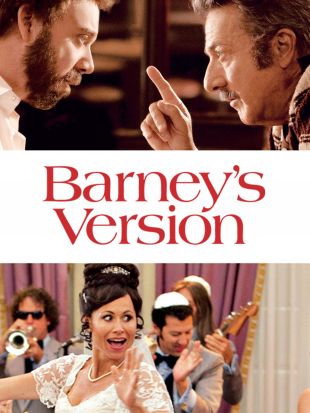
Barney's Version, the long-gestated screen adaptation of Mordecai Richler's 1997 novel, succeeds at reproducing its author's tone as well as prior Richler cinematizations. Fans will have no problem instantly identifying Richler's voice -- that of a Montreal native unafraid to make wickedly barbed and satirical, yet deeply affectionate, observations about the Canadian Jewish subculture in which he was raised, and the world as a whole. The success of the film shouldn't come as a surprise, given the fact that maverick Canadian producer Robert Lantos -- the individual also responsible for the outstanding Joshua Then and Now -- engineered the production. Like Joshua, Barney epitomizes the ideal screen adaptation of one of Richler's sprawling novels, in that it catches the essence of the writer's paradigm; the individual story developments become secondary, even tertiary; and we can relax and immerse ourselves in the ebb and flow of the central character's life, instead of fretting over the omission or addition of one sequence or another.
The movie, as per the novel, follows the life journey of Montreal-based soap opera producer Barney Panofsky (Paul Giamatti), the owner of Totally Unnecessary Productions. Beginning in the present day -- where senior citizen Barney is both under investigation for the murder of a friend by a boorish, vaguely anti-Semitic detective (Mark Addy), and saddled with the estrangement of his third wife, Miriam (Rosamund Pike) -- the picture flashes back in time to chronicle Barney's ill-fated marriage to his first wife (Rachelle Lefevre) in Rome; his relocation to Montreal; his misguided second marriage to a wealthy, spoiled-rotten Jewish princess (Minnie Driver); and, soon after, the moment when he falls helplessly in love with his dream girl, Miriam -- at his second wedding.

As created by Richler and brought to life onscreen by Giamatti, Panofsky instantly wins us over. The character could easily be mistaken for a sad sack at first glance (especially during his older years), but the movie is structured so that the narrative quickly undercuts our initial impressions of him, unveiling the nobility (and amiability) of Barney's character. We see it in the inspired ways that he schemes to get Miriam back from an oily radio producer (Bruce Greenwood), such as subscribing the rival to a gay pornographic magazine; we see it in Barney's willingness to stick up for his endearing father (Dustin Hoffman); we see it in the purity of his love for Miriam. These qualities (and others) encourage us to embrace him with open arms and accept him as our onscreen surrogate. Yet Barney is also deeply, irreparably flawed -- not above addictive, selfish, or thoughtless behavior, especially in the context of his third marriage. The heroic and the errant in this character come together with such grace and ease that the filmmakers succeed at turning Barney into a quintessential tragic hero.
We get much of Richler's trademark edgy humor for the first 40 minutes or so, often with little throwaway jabs at cultural stereotypes (as in a line about a Jewish mother-in-law hoarding all the free soaps from a hotel room); what's surprising in this instance is the movie's subsequent transition from low-down comedy into more earnest material. With the exception of a few scenes, much of the laughter disappears from the picture at about the same moment that Miriam enters. Here the movie bares its heart and soul, and begins to hinge on our hopes for the emotional fortitude of the relationship -- initially, as Barney goes to tremendous lengths to pursue Miriam, and later, as their marriage begins to crack and strain -- but the underlying love and devotion remain palpable. We intimately understand the passion that binds these two together, to such a degree that when director Richard J. Lewis leads into a bedroom scene between them, and then cuts out with a freeze frame, it almost seems disappointing -- we want to see an erotic love scene between husband and wife. This is the rare film that earns it.
Some might deride the movie for being too coy or sentimental in its second half, but sentimentality is only deadly when artificial; the emotion in the film's final acts doesn't once feel excessive because Giamatti and the filmmakers have so gently and effectively guided us into emotional investment in Barney and his choices -- most viewers will care about him intensely, and hope like hell that he makes the right decisions. This makes the story's unexpected final developments as poignant as they are credible.
